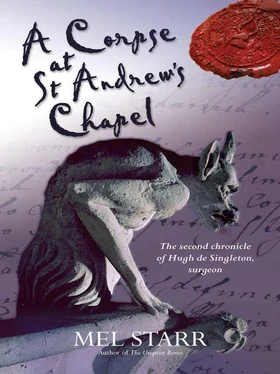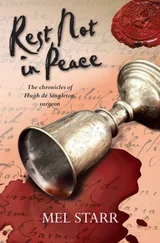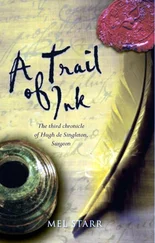Mel Starr - A Corpse at St Andrew's Chapel
Здесь есть возможность читать онлайн «Mel Starr - A Corpse at St Andrew's Chapel» весь текст электронной книги совершенно бесплатно (целиком полную версию без сокращений). В некоторых случаях можно слушать аудио, скачать через торрент в формате fb2 и присутствует краткое содержание. Год выпуска: 2010, Издательство: Kregel Publications, Жанр: Исторический детектив, на английском языке. Описание произведения, (предисловие) а так же отзывы посетителей доступны на портале библиотеки ЛибКат.
- Название:A Corpse at St Andrew's Chapel
- Автор:
- Издательство:Kregel Publications
- Жанр:
- Год:2010
- ISBN:нет данных
- Рейтинг книги:5 / 5. Голосов: 1
-
Избранное:Добавить в избранное
- Отзывы:
-
Ваша оценка:
- 100
- 1
- 2
- 3
- 4
- 5
A Corpse at St Andrew's Chapel: краткое содержание, описание и аннотация
Предлагаем к чтению аннотацию, описание, краткое содержание или предисловие (зависит от того, что написал сам автор книги «A Corpse at St Andrew's Chapel»). Если вы не нашли необходимую информацию о книге — напишите в комментариях, мы постараемся отыскать её.
A Corpse at St Andrew's Chapel — читать онлайн бесплатно полную книгу (весь текст) целиком
Ниже представлен текст книги, разбитый по страницам. Система сохранения места последней прочитанной страницы, позволяет с удобством читать онлайн бесплатно книгу «A Corpse at St Andrew's Chapel», без необходимости каждый раз заново искать на чём Вы остановились. Поставьте закладку, и сможете в любой момент перейти на страницу, на которой закончили чтение.
Интервал:
Закладка:
During the vicar’s tale I found my wits and calmed myself so I was able to make answer.
“What would be buried with Henry atte Bridge to lure grave robbers? They did not molest Alan’s grave?”
“Nay. Just the one…it appears.”
“Let us go see,” I suggested. “Perhaps some explanation will present itself.”
I fervently hoped this would be so. At least the walk to the church would give me time to devise an explanation. I did not wish to speak the truth to the vicars of St Beornwald’s Church, at least, not yet, but neither would I lie. I resolved to tell the truth if I must, but misdirect Father Thomas to some other resolution if I could. As we entered the churchyard such an opportunity presented itself.
“There,” Father Thomas exclaimed as we passed through the lych gate. “You can see from here what Father Simon saw. Though the soil of the cotter’s grave is some drier now.”
The vicar was correct, and Simon Osbern was to be commended for his perception. The two graves, those of Alan and Henry, were some twenty paces apart. Alan’s lay just under the spreading canopy of an elm, a giant tree which grew up long centuries ago just outside the churchyard wall. Indeed, the wall was askew where the tree had grown up under it and lifted the stones. Henry atte Bridge’s grave lay well away from this or any other tree, in the open.
I stood quietly between the two graves and lifted my head to study the elm. New leaves were beginning to appear on its spreading branches. Thomas de Bowlegh studied me, the candle yet in his hand, as I considered the tree.
I walked first to Alan’s grave, knelt, and sifted the dry surface soil through my fingers, then did the same at Henry’s grave. The soil here was yet moist from being disturbed. There was no denying it, or suggesting the discovery but a product of an over active imagination. I felt the grass around the grave, inspected my fingers, then peered up at the elm again.
“You found the candle here?” I asked as I stood to my feet.
“Father Simon did.”
“Perhaps the damp earth and the candle may be unrelated.”
The vicar’s eyebrows lifted in question at this. I continued.
“There was a heavy dew last night…see how the turf is yet beaded with it here, about the cotter’s grave. But there,” I pointed toward the beadle’s grave and the old elm, “there is little wet, for the tree shielded the ground and dew collected on the new leaves rather than the grass.”
The vicar inspected the wet grass beneath his feet, then Alan’s grave, and then his eyes turned skyward to examine the elm.
“What of this candle?” he asked.
“’Tis but a stub,” I observed. “Most likely it came from castle or church.” This was no lie. “Perhaps it came from the church, in the cloak of some townsman who saw it was near gone and found opportunity to take it for use in his home.” This very nearly was a lie, for surely I wished Father Thomas to believe a thing I knew to be false. I apologized later and the vicar was quick to absolve me. My conscience rested the better for it.
“Surely it must be as you have said,” the vicar agreed. “There could be nothing buried with Henry atte Bridge worth the digging to retrieve.”
The priest was wrong, but did not know it. This seems usually the case with error. If a man knows he is wrong about a thing he will usually amend his thoughts so they may harmonize with truth. Usually. There are, I think, those who would rather hold to error, whatever the evidence, than be forced to change their thoughts of a matter.
I left Father Thomas satisfied that his churchyard had not been violated. I needed to see to Philip and had intended to do so for several days. As I was in the town and near the bakery, I walked to his home to perform my duty.
The baker’s shutters were open and the fragrance of new loaves poured from his shop. This odor was not the only thing the bakery produced. A woman’s shrill voice, shouting curses and imprecations, flowed also into the street. I was uneasy for eavesdropping, yet all who walked the street that day with me heard the same. The woman’s last words were plain: “And a plague on that meddling surgeon!” she screeched. “Better you should’ve died like a dog in the street!”
A door slammed, and all was silent. I made for the shop entrance, thought better of it, and hastened on down the High Street a hundred paces or so before I turned and reapproached the bakery. I hoped Philip would believe my appearance was tardy enough that I had not heard his wife’s fulminations.
Baking was near done for the day. Philip was drawing the last loaves from the oven as I entered. The bakery was pleasantly warm; even so, I thought Philip perspired more than would be produced by a warm oven on a mild spring day. Sweat beaded his forehead and upper lip. He wiped it away with a sleeve as he saw me enter, and bid me “G’day” in a voice both harsh and low. I returned the greeting, but reflected that, from the sounds I had heard earlier, this was not a good day for the baker, nor was it likely he enjoyed many good days at all. Solomon the wise wrote that a nagging wife was like water dripping endlessly. A shrieking wife must be a never-ending torrent. I had a brief thought that perhaps a wife was not an untarnished blessing after all, but the notion soon passed.
“I have come to inspect your wound,” I said lightly. The baker lifted his hand to the bandage on his neck.
“It causes me no pain,” Philip muttered. What pain he felt came from another source, I think.
“I will unwrap the dressing and see how it knits. Here…be seated on this bench.”
Philip obeyed and I went to my work. I was pleased to see a clean wound. The stitches held well. There had been some bleeding and pus issue onto the wrapping, but not for some days. The residue was dry and hard. The egg poultice had done its work. And perhaps the hot iron which caused the injury had cauterized it as it sliced through flesh.
A door opened as I inspected the wound. No doubt the man’s wife had re-entered the bakery. Shortly after I heard footfalls on the steps leading to the living quarters on the upper floor. Philip said nothing, but his eyes swung wildly, as if he expected to be impaled upon a bread knife at any moment.
“We may leave off the dressing now. The hurt heals well. Whatever,” I asked casually, “did Edmund do to cause you to swing a hammer at him? That’s a poor contest for any man to enter against a smith.”
I waited, but there was no answer. Philip moved a hand cautiously to his neck, and said finally, “No dressing? You will not dress my hurt?”
I explained, as I find myself obliged often to do, that I follow the practice of Henry de Mondeville. That learned surgeon taught that wounds heal best when left dry, open to the air. I had wrapped Philip’s wound only to retain the poultice, and to protect the cut from further injury. Healing had progressed so that there was no longer a need. But Philip’s injury was ugly and left a red streak down his neck, from jaw to kirtle. I think he wished it covered for appearance as much as healing. All who saw the wound would remember that Edmund had bested him.
When I finished my explanation of his treatment I ventured again to the cause. “Do you wish to charge Edmund with assault at hallmote?”
Philip hesitated. “Nay…’twould do no good.”
“What good will be done should no charge be brought?”
“No good,” he muttered, “but perhaps less harm.” And with that he turned to deal with his loaves, a sign of dismissal. But I was not to be put off so easily.
“My fee for saving your neck is four pence.”
The baker shrugged, left the room for a moment through a passage next to his oven, and shortly returned. He held out a hand to me, and when I raised my own he dropped four silver pennies into it. Silently.
Читать дальшеИнтервал:
Закладка:
Похожие книги на «A Corpse at St Andrew's Chapel»
Представляем Вашему вниманию похожие книги на «A Corpse at St Andrew's Chapel» списком для выбора. Мы отобрали схожую по названию и смыслу литературу в надежде предоставить читателям больше вариантов отыскать новые, интересные, ещё непрочитанные произведения.
Обсуждение, отзывы о книге «A Corpse at St Andrew's Chapel» и просто собственные мнения читателей. Оставьте ваши комментарии, напишите, что Вы думаете о произведении, его смысле или главных героях. Укажите что конкретно понравилось, а что нет, и почему Вы так считаете.












